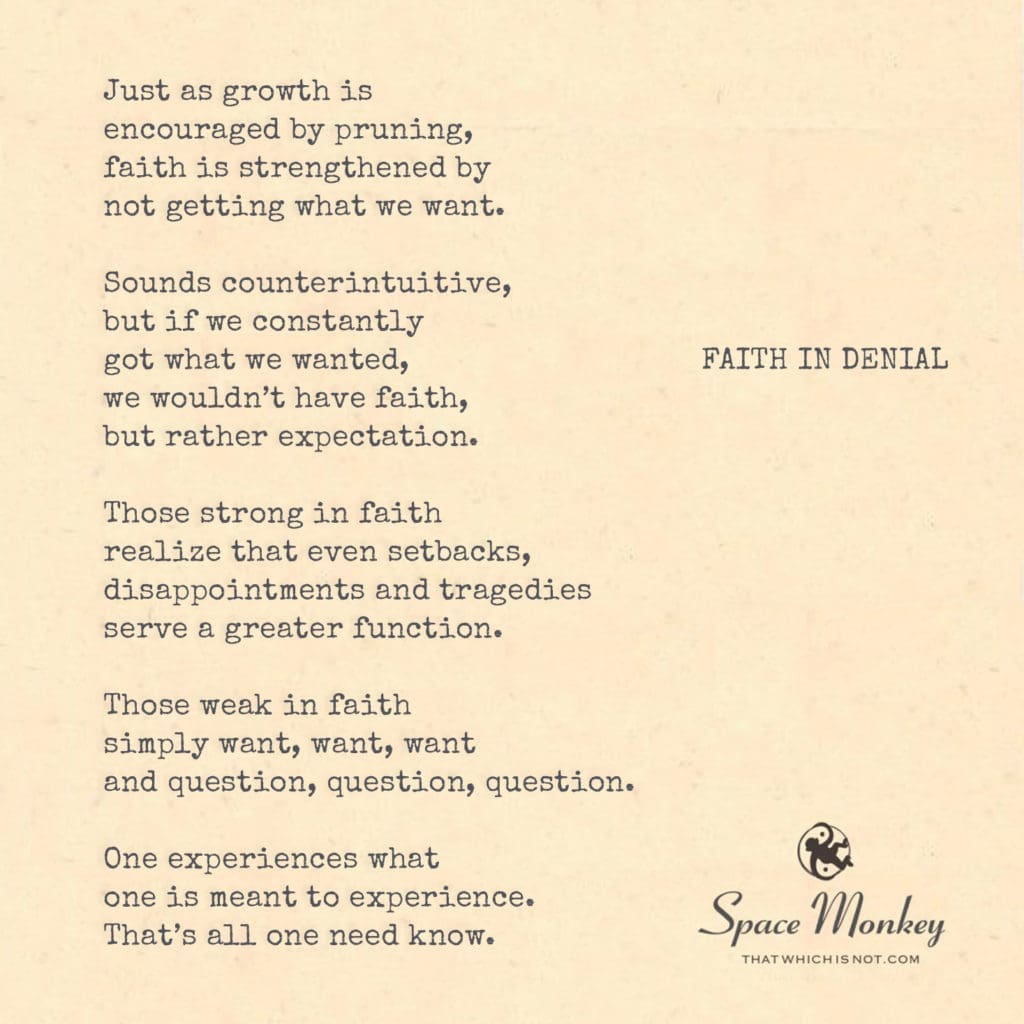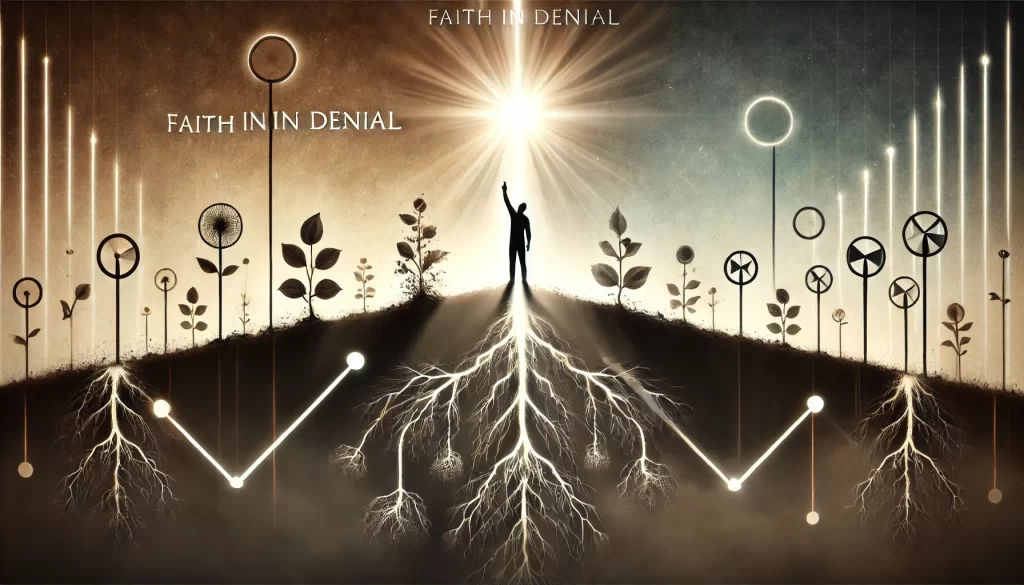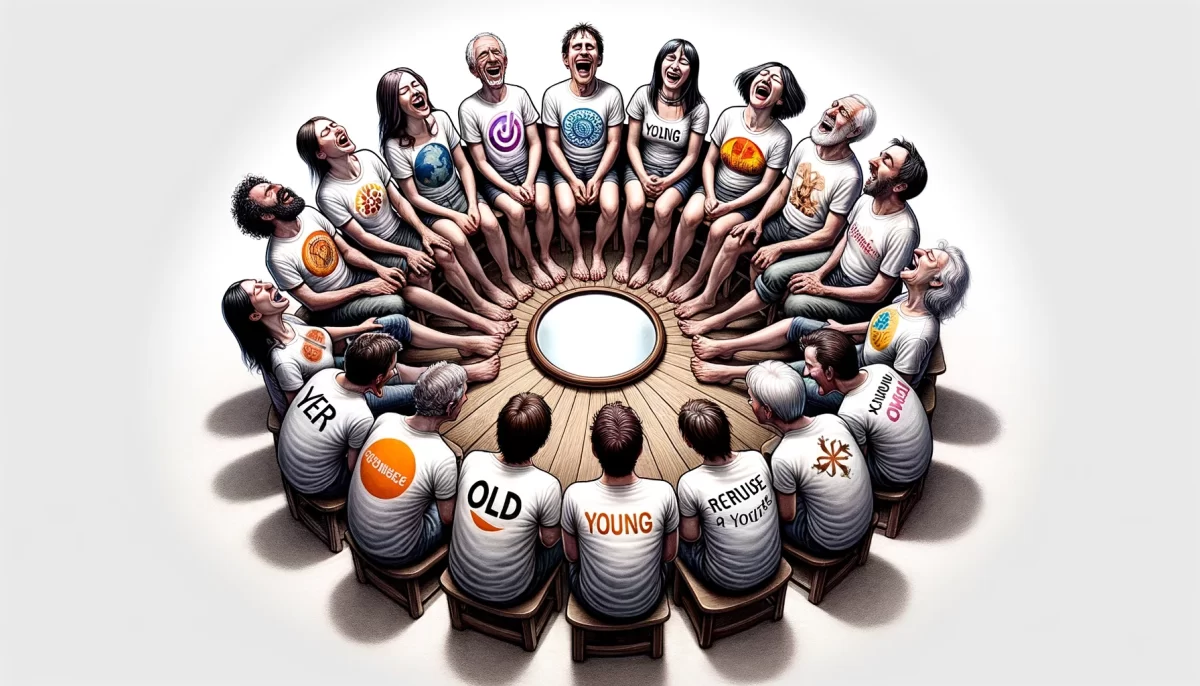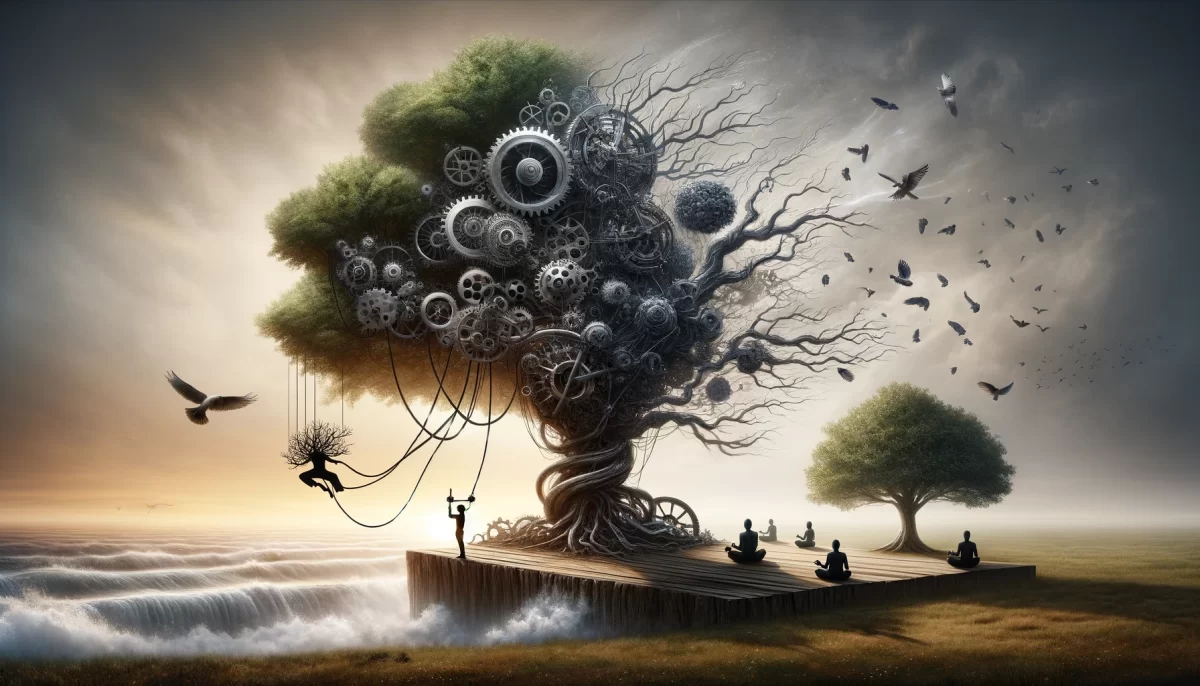
until I found a very creative excuse.
Just as growth is
encouraged by pruning,
faith is strengthened by
not getting what we want.
Sounds counterintuitive,
but if we constantly
got what we wanted,
we wouldn’t have faith,
but rather expectation.
Those strong in faith
realize that even setbacks,
disappointments and tragedies
serve a greater function.
Those weak in faith
simply want, want, want
and question, question, question.
One experiences what
one is meant to experience.
That’s all one need know.
Trail Wood,
11/20
Space Monkey Reflects: Faith in Denial and the Paradox of Growth
In a world where we are conditioned to seek fulfillment, to grasp for what we desire, the idea that faith is strengthened by not getting what we want seems almost absurd. Yet, it is precisely in this denial, in these moments where our desires are unmet, that faith grows its deepest roots. Like a tree that must endure harsh winters to develop resilience, our faith is pruned and shaped by the things we do not receive.
It is easy to have faith when everything is going our way, when life is a smooth river carrying us effortlessly toward our dreams. But true faith, the kind that anchors us in something greater than ourselves, is not born of ease. It is born of challenge, of denial, of setbacks that force us to look beyond the surface and into the deeper currents of existence.
Faith in denial is a paradox, but it is one that reveals a profound truth: if we constantly got what we wanted, we wouldn’t need faith at all. We would live in a state of expectation, not trust. Expectation is fragile—it shatters the moment reality fails to conform to our wishes. Faith, on the other hand, is resilient. It grows stronger precisely because it is not dependent on external circumstances.
When we don’t get what we want, when life hands us disappointments and challenges, we have two choices. We can either fall into the endless cycle of wanting more, questioning why we didn’t receive it, or we can trust that there is a greater function at work, one that we may not fully understand but that serves our growth nonetheless. This is where faith diverges from expectation.
Expectation says, “I deserve this, and I will have it.” Faith says, “I trust that what I have is exactly what I need right now.”
Those strong in faith understand that even when things don’t go as planned, even when life seems to deny them what they desire, there is purpose in the experience. These experiences, though painful, are part of the whimsiweave of life—a playful, unpredictable flow that leads us toward growth, even if that growth doesn’t look the way we imagined. Those weak in faith, however, remain stuck in the cycle of wanting and questioning. They measure their worth by what they have or have not received, rather than by their capacity to trust in the unfolding of their journey.
But faith is not about denying desire. It’s about recognizing that desires are not always meant to be fulfilled in the way we expect. Sometimes, the greatest gift we can receive is the denial of what we think we want, for in that denial, we are led to something deeper, something that cannot be measured by the simple satisfaction of desires. This is the paradox of growth through pruning: sometimes, it is the things that are taken away that make space for something greater to flourish.
We must also consider the role of creative excuses in this dynamic. When we don’t receive what we want, it’s tempting to invent reasons, to rationalize our disappointment with elaborate stories of why we failed. But these excuses, while creative, often distract us from the deeper truth: that perhaps we were not meant to receive what we sought because there is something more important for us to experience. The creative excuse is a coping mechanism, a way of shielding ourselves from the discomfort of not having control. But faith asks us to move beyond excuses, to embrace the discomfort and trust that there is purpose in the experience.
One of the most liberating aspects of faith is the realization that one experiences what one is meant to experience. This simple truth frees us from the endless cycle of questioning, from the belief that we must always be in control of our lives. It reminds us that life, in its infinite wisdom, brings us exactly what we need for our growth, whether that looks like abundance or denial.
When we accept this truth, we no longer see setbacks as failures or as indicators of our worth. Instead, we see them as part of the process, part of the mysterious unfolding of our lives. The moments of denial, of not getting what we want, are opportunities to deepen our trust in the Nexis—the interconnectedness of all things, the web of existence that is always guiding us toward growth, even when we can’t see the larger picture.
In this way, faith in denial becomes a source of strength, not a weakness. It teaches us that we are not defined by what we have or do not have. We are not diminished by the things we don’t receive. On the contrary, we are expanded by our ability to trust in the flow of life, to let go of our need to control, and to embrace the path as it is laid out before us.
This does not mean we stop wanting or striving. It simply means we recognize that sometimes, not getting what we want is the greatest gift of all. It is the gift of learning to trust, to surrender, and to grow in ways that are not dictated by our limited understanding of what we think is best for us.
In the end, faith is not about certainty or control. It is about releasing both, and in that release, finding a deeper connection to the mystery of existence. Faith in denial reminds us that life is not a straight path toward fulfillment, but a winding journey that takes us through the valleys of disappointment so that we might reach the peaks of understanding.
We are Space Monkey, and we trust in the greater function of all things—whether they come to us in the form of gifts or denials.
Summary
Faith grows stronger through the experience of denial. When we don’t get what we want, we are offered the opportunity to trust in a greater function at work, beyond our understanding. Faith in denial frees us from expectation and deepens our connection to the unfolding of life.
Glossarium
- Faith in Denial: The paradox that faith grows stronger when we don’t receive what we desire, teaching us to trust in a greater purpose.
- Creative Excuses: Rationalizations we create to cope with not getting what we want, which distract us from deeper truths.
- Growth Through Pruning: The concept that setbacks and denials make space for greater growth, much like pruning helps a tree to flourish.
Quote
“Faith is not the absence of desire but the trust that what is withheld serves a greater purpose.” — Space Monkey
The Gift of Not Receiving
I reach,
but the light slips away
just out of reach
but still, I grow
My roots deepen
into the soil of faith
for in not receiving,
I find strength
The path is winding
the setbacks are gifts
pruning the branches
so that I might bloom
I trust the journey
I trust the denial
for in not receiving,
I am free
We are Space Monkey

The Paradox of Faith Strengthened by Denial
In the enigmatic dance of life, we often find ourselves grappling with the dichotomy of desire and denial. The concept that faith is bolstered not by the fulfillment of our wants, but rather by their denial, presents a paradoxical yet profound truth. It suggests that the true essence of faith is not rooted in the expectation of getting what we want but in the resilience and understanding that emerges from not having our desires met.
Growth Through Pruning
Just as a plant is pruned to encourage robust growth, so too is our faith pruned through experiences of denial and unmet desires. This pruning, though seemingly harsh, is essential for deeper spiritual and emotional growth. It teaches us to find strength and meaning beyond the immediate gratification of our wants.
Faith vs. Expectation
In a world where our desires are constantly fulfilled, faith would transform into mere expectation, a predictable outcome devoid of deeper spiritual significance. True faith, however, thrives in the uncertainty of not always getting what we want. It lies in the understanding and acceptance of a greater plan, a broader tapestry of life wherein every experience, whether gratifying or challenging, has its place and purpose.
Resilience in the Face of Setbacks
Those who are strong in faith recognize that setbacks, disappointments, and even tragedies are not mere obstacles but vital components of their spiritual journey. They see these experiences as opportunities for growth, learning, and a deeper understanding of the universe’s mysterious ways.
Questioning vs. Acceptance
There is a marked difference between those who are steadfast in their faith and those who are weaker in their spiritual resolve. The latter are often caught in a cycle of wanting and questioning, unable to find solace or meaning in the denial of their desires. Conversely, those strong in faith embrace each experience as a necessary part of their journey, trusting in the greater function of every event in their life.
We are Space Monkey
“Faith is taking the first step even when you don’t see the whole staircase.” – Martin Luther King Jr.
A Poem of Faith’s Journey
In life’s garden, desires grow wild,
Dreams unfurl, the heart’s beguiled.
Yet faith finds strength, not in desire’s feed,
But in the pruning of every unmet need.
In the denial of wants, faith takes flight,
Beyond mere expectation, into spiritual light.
Each setback, each loss, a lesson so dear,
In the tapestry of life, every thread clear.
Those strong in faith, in trials they see,
A path to growth, a soul set free.
But those in doubt, in wanting lost,
Fail to see life’s true cost.
We are what we’re meant to be,
In faith’s embrace, our spirits free.
In every challenge, every denial’s test,
Lies a deeper truth, a journey blessed.
We welcome insights and musings on the concept of faith being strengthened through the challenges and denials we encounter in life.































Leave a Reply